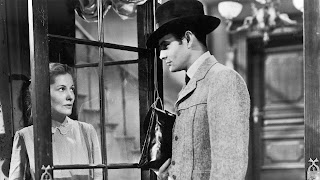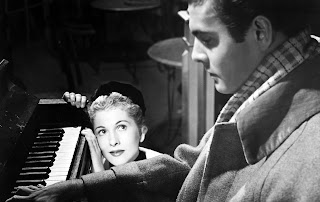In Vienna circa 1900, former star concert pianist Stefan Brand (Louis Jourdan) is now a shell of his former self. Having ill-advisedly accepted a duel-at-dawn, he plans to pack up and flee the city during the night.
But he is distracted by a long letter from a woman, with the first line proclaiming she may already be dead. He proceeds to read the letter, and in flashback the story of Lisa (Joan Fontaine) is revealed. She was a young teenager from a modest background living with her mother when Stefan moved into an adjacent apartment in the same building. She was immediately enamoured by the handsome pianist and loved listening to him practice through the walls, although he barely noticed her.
After Lisa's mother remarried and moved the family to a different town, Lisa rebuffed a suitor and returned to Vienna, where she found a job and kept tabs on Stefan's movements. As a star pianist he lived the good life with no shortage of women for company. Lisa has one brief opportunity to spend time with the man of her dreams, but fate intervenes and confines her to the status of an unknown woman.
The plot of Letter From An Unknown Woman is both constrained and aggravating. The running length of 86 minutes feels substantially longer, because the Howard Koch script has very few notes to play with. This is a weepy drama about a child who grows into a woman trapped into a dream-like state of fascination with a man who barely knows she exists. While the teenaged Lisa can be excused, her persistent capitulation to his charms as a grown woman, fully aware of his playboy reputation, is more exasperating than tragic.Director Max Ophüls and cinematographer Franz Planer elevate the scant material with touches of cinematic majesty. The camera glides across convincing sets, and beautifully choreographed long shots accompany the actors up and down the stairs and through narrow hallways. Vienna is recreated across many locations as a thriving city, frequent nighttime scenes adding to the gloom but captured in mysterious black and white. Lisa may be hypnotized by a philanderer, but Ophüls knows how to capture the look of devotion by focusing soft light on a transcendent Joan Fontaine.
Trains play a big role in Lisa's story. A couple of train station farewell scenes are stock milestones, but an amusement ride with painted backgrounds is a clever metaphor for her soaring hope and Stefan's pragmatic fakery coming together for an interlude of happiness.
The ending goes looking for layers of tragedy to pile onto the misery of misdirected love, a disease creeping into Lisa's narrative as a foreign agent of intervention. If she is unwilling to confront her hopelessly poor judgment, perhaps a convenient infection is the cure for futile infatuation.
All Ace Black Movie Blog reviews are here.




No comments:
Post a Comment
We welcome reader comments about this post.